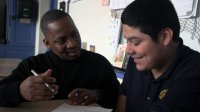How Should We Measure Student Learning? 5 Keys to Comprehensive Assessment
Stanford professor Linda Darling-Hammond shares how using well-crafted formative and performance assessments, setting meaningful goals, and giving students ownership over the process can powerfully affect teaching and learning.
Your content has been saved!
Go to My Saved Content.5 Keys Video Series
See Edutopia's core strategies in action with our Five Keys video series. Take a deeper look at each strategy as we share the nuts and bolts of program implementation, give voice to examples from schools around the country, and illuminate the research behind the practices.
Assessment is at the heart of education: Teachers and parents use test scores to gauge a student's academic strengths and weaknesses, communities rely on these scores to judge the quality of their educational system, and state and federal lawmakers use these same metrics to determine whether public schools are up to scratch.
Testing forms the bedrock of educational assessment and represents a commitment to high academic standards and school accountability. You can't know where you're going unless you know where you are. But when the financial and emotional stakes associated with standardized tests are disproportionately high, this laudable goal gets distorted. Teachers begin teaching to the test simply to raise scores, often at the expense of more meaningful learning activities. And when the tests are too narrow a measure or aren't properly aligned to standards, they provide little concrete information that teachers and schools can use to improve teaching and learning for individual students.
Twenty-First-Century Assessment
The demands of the today's world require students learn many skills. A knowledge-based, highly technological economy requires that students master higher-order thinking skills and that they are able to see the relationships among seemingly diverse concepts. These abilities -- recall, analysis, comparison, inference, and evaluation -- will be the skills of a literate twenty-first-century citizen. And they are the kinds of skills that aren't measured by our current high-stakes tests.
In addition, skills such as teamwork, collaboration, and moral character -- traits that aren't measured in a typical standardized tests -- are increasingly important. Businesses are always looking for employees with people skills and the ability to get along well with coworkers.
Multiple Forms of Assessment
We know that the typical multiple-choice and short-answer tests aren't the only way, or necessarily the best way, to gauge a student's knowledge and abilities. Many states are incorporating performance-based assessments into their standardized tests or adding assessment vehicles such as student portfolios and presentations as additional measures of student understanding.
These rigorous, multiple forms of assessment require students to apply what they're learning to real world tasks. These include standards-based projects and assignments that require students to apply their knowledge and skills, such as designing a building or investigating the water quality of a nearby pond; clearly defined rubrics (or criteria) to facilitate a fair and consistent evaluation of student work; and opportunities for students to benefit from the feedback of teachers, peers, and outside experts.
With these formative and summative types of assessment come the ability to give students immediate feedback. They also allow a teacher to immediately intervene, to change course when assessments show that a particular lesson or strategy isn't working for a student, or to offer new challenges for students who've mastered a concept or skill. Return to our Assessment page to learn more.
More Edutopia Resources for Comprehensive Assessment
- CORE STRATEGY PAGE: Comprehensive Assessment
Use this roundup page to discover the value of using different ways to assess the full range of student ability -- social, emotional, and academic achievement.
- ARTICLE: Comprehensive Assessment Research Review
Assessment is the single most effective instructional strategy to increase learning. Learn about the key comprehensive assessment practices that have been shown by research to promote learning.
